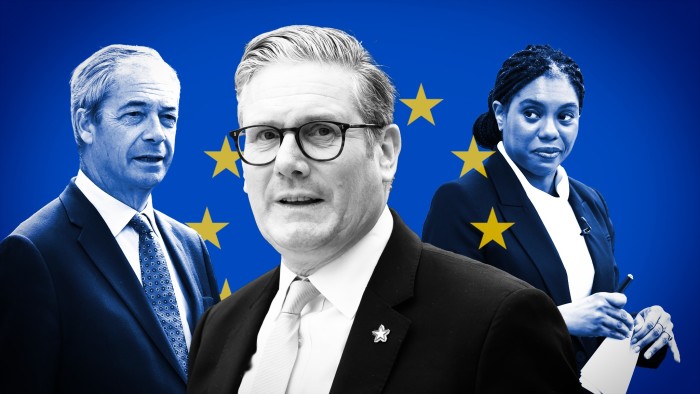Sir Keir Starmer claimed on Monday that he had moved on from the “stale old debates and political fights” of the Brexit era. He is about to find out whether that is true.
The reaction to his “reset” of EU-UK relations was grimly reminiscent of the arguments over Brexit, the debate sulphurous with talk of a “surrender summit” and the “betrayal” of UK sovereignty and British fishermen.
The prime minister’s challenge is to convince voters that his deal does indeed address the challenges facing Britain in the mid-2020s, and that old debates over Brexit are a relic of the last decade.
Some Labour MPs would have preferred Starmer to start making the case for his deal — which has been months in the making — long before he signed the agreement with EU leaders at Lancaster House on Monday.
Rather than engage with the European debate, Starmer instead spent the last few months denying he had any intention of agreeing some of the things he set in train on Monday — including a youth mobility scheme.
In the absence of significant “pitch rolling” by the prime minister, opponents including Reform UK’s Nigel Farage and the Conservative leader Kemi Badenoch have piled in, with the Tory leader suggesting that Starmer entered these talks as a “supplicant”.
The summit communiqué contained ample material for Brexiters — and their supporters in the media — to work with, including the 12-year extension of the rights of EU fishermen to operate in UK waters.
The accompanying plans to lower barriers to trade in food came with an agreement that Britain would “dynamically align” with future Brussels rules in the area, with no right to vote on them. Badenoch has vowed to reverse this measure, which she sees as an affront to national sovereignty.
Nestled in the small print there is also an undertaking by Britain to pay money to Brussels to develop work in the area of food and animal standards. The European Court of Justice will remain the arbiter on points of EU law.
Starmer’s press conference at Lancaster House marked the start of a marketing campaign. He presented the deal as a triumph for British consumers, business and security over the ideological fixations of the Brexiters.
The deal would unlock £9bn a year of economic benefits by 2040 through easier trade, he claimed, reversing some of the failings of Boris Johnson’s Brexit deal. Food prices for consumers would fall.
British travellers would find it easier to use e-gates and take their pets to Europe on holiday, while fishermen — although they would have to share their fish with their EU counterparts — would also benefit from easier trade in their products with Europe.
“It’s time to look forward,” Starmer said. “To move on from the stale old debates and political fights to find common sense, practical solutions which get the best for the British people.
“We’re ready to work with partners if it means we can improve people’s lives here at home. So that’s what this deal is all about — facing out into the world once again, in the great tradition of this nation.”
Starmer’s argument is that Britain was exercising its right to apply EU regulations in key areas in the interests of business and shoppers — rather than taking a purist view of sovereignty.
“Building the relationships we choose, with the partners we choose, and closing deals is in the national interest,” he said. “Because that is what independent, sovereign nations do.”
The security and defence partnership agreed at Lancaster House — opening the way to closer relations with the EU in terms of rearmament and military training — was hailed as a prime example of that.
With Reform UK breathing down Labour’s necks in working class areas — as confirmed in this month’s English local elections — deliberately reopening memories of Brexit arguments is a risky strategy for Starmer.
But he is seeking to argue that ordinary voters want the Labour government to be striking trade deals with the EU — as with India and the US earlier this month — and that they will benefit financially from them.
Although the media environment for making such an argument remains toxic, the polls suggest that the public has moved on from Brexit and that many people who voted to leave the EU now feel disillusioned that the “promise of Brexit” has not materialised.
A YouGov poll found that only 13 per cent of voters list “Britain leaving the EU” as one of their three main areas of concern today, compared with more than 70 per cent in 2020 at the height of Brexit negotiations.
A YouGov survey in January 2025 to mark the fifth anniversary of Brexit taking effect found that 55 per cent of Britons now say it was wrong for the UK to leave the UK, with only 11 per cent seeing Brexit as more of a success than a failure.
Against that backdrop there are also risks for Farage and Badenoch in engaging in arguments over a Brexit project that many voters now see as a failure. Farage, notably, has shifted his focus to issues such as climate change, “woke” issues, and the economy.
Starmer on Monday presented his deal as “good for jobs, good for bills and good for our borders”: a post-Brexit agreement presented as retail politics. The coming days will see whether Britain really has put behind it what he calls the “battles of the past”.




